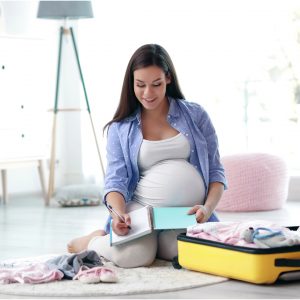09 Jun What to Pack in Your Hospital Bag
Packing your hospital bag in preparation for the birth can be exciting and intimidating. Everything suddenly feels very real. Soon your family will have a new member. The NHS recommends getting ready at least two weeks before the birth[1]. However, it can be sensible to be prepared by around 35 weeks, in case your baby makes an early arrival.
When you’re planning your birth, there’s plenty to think about. But don’t panic, our check-lists will ensure you have everything you need for the birth, for your birthing partner, and for your beautiful new baby:
 What you need for labour:
What you need for labour:
- Your maternity notes and birth plan
- Nightshirt or other loose, comfortable outfit that you can move around in and won’t make you too hot as hospitals can be very warm
- Dressing gown or bathrobe
- Socks and slippers, make sure they’re non-slip so that you don’t take a tumble
- Towel and flannel or sponge, to stay cool, clean, and fresh. A facial water spray can also be refreshing
- Hair bobbles or a band to keep your hair out of your face
- Books, magazines, e-reader or downloaded films to keep you busy if your baby is taking their time – and if you need reading glasses don’t forget those
- Phone, charger, battery pack and headphones
- Lip salve for dry and cracked lips
- Your skin may get dehydrated in the hot, hospital environment. Use an emollient like AproDerm® Emollient Cream to rehydrate and moisturise your skin or for a soothing massage
- Water and snacks to stay hydrated and sustain your energy
- An extra pillow or cushion to maintain your comfort
- TENS machine if you plan to use one
- Any medications you are taking, in their original containers
- Anything you are planning to use in labour like a birthing ball or aromatherapy oils
- Your birth partner’s contact details, in case they aren’t with you when you go in
For your baby:
- Some mums like to take a special outfit or shawl to wrap their baby when they are first born
- Vests, sleepsuits, and bodysuits. It can be sensible to pack three of each in case you need to stay in a while
- Nappies, take plenty, so you’re not caught short
- Wipes or cotton wool
- AproDerm® Barrier Cream to protect your baby’s sensitive skin and prevent nappy rash
- Socks, booties, hat and scratch mitts
- Muslin squares to protect your clothing and wipe up any dribbles, sickness, and spills
- Baby blanket to swaddle your little one and keep them warm
- A car seat to ensure a safe journey home
- An outfit with a coat, shawl or pram suit for their very first expedition into the big, wide world
For after the birth:
- A wash bag, toothbrush, and all essential toiletries
- Lots of disposable pants or some bigger than normal briefs and absorbent maternity pads to protect your clothing
- Comfortable and supportive nursing bras and breast pads to absorb any leaks
- A couple of changes of nightwear. It’s sensible to choose button fronted designs to make breastfeeding access easier
- Mobile phone, charger, and spare battery pack
- Hairbrush and make-up if you wear it
- Change, cash or a contactless card to buy food and drinks
- Clothes and shoes for the journey home with your new baby. Choose garments that are loose and comfortable; it can take a while to fit back into your old jeans and they are the last thing that you want to be wearing if you’ve had stitches or a C-section
For your birth partner:
- A copy of your birth plan so that they can refer to it and be your advocate when you’re busy giving birth
- A contact list of friends and family, so they can tell them your happy news when the time comes
- Their mobile phone, a charger, and back up battery pack
- Camera, if they prefer one to their phone
- A change of clothes in case they get sweaty or messy or have to stay overnight
- Things to keep them busy like books, films, podcasts or playlists
- Snacks and drinks, it could be a long wait for your new baby to appear
- Cash, card or change for food and car-parking
Do ask your midwife for any recommendations and check your maternity notes for more tips and advice on what to pack in your hospital bag. Also look up what your local policy is during the current COVID-19 pandemic.
You can use any bag as a hospital bag, but it’s a good idea to divide your items between a few bags so that everything is easier to find. Just remember to leave the bags somewhere where you or your birthing partner can reach them easily when labour starts.
Good luck!
References
- 1 NHS (2018) ‘Pack your bag for labour: Your pregnancy and baby guide’ NHS, viewed 8 June 2020 – <https://www.nhs.uk/conditions/pregnancy-and-baby/pack-your-bag-for-birth/>



Sorry, the comment form is closed at this time.